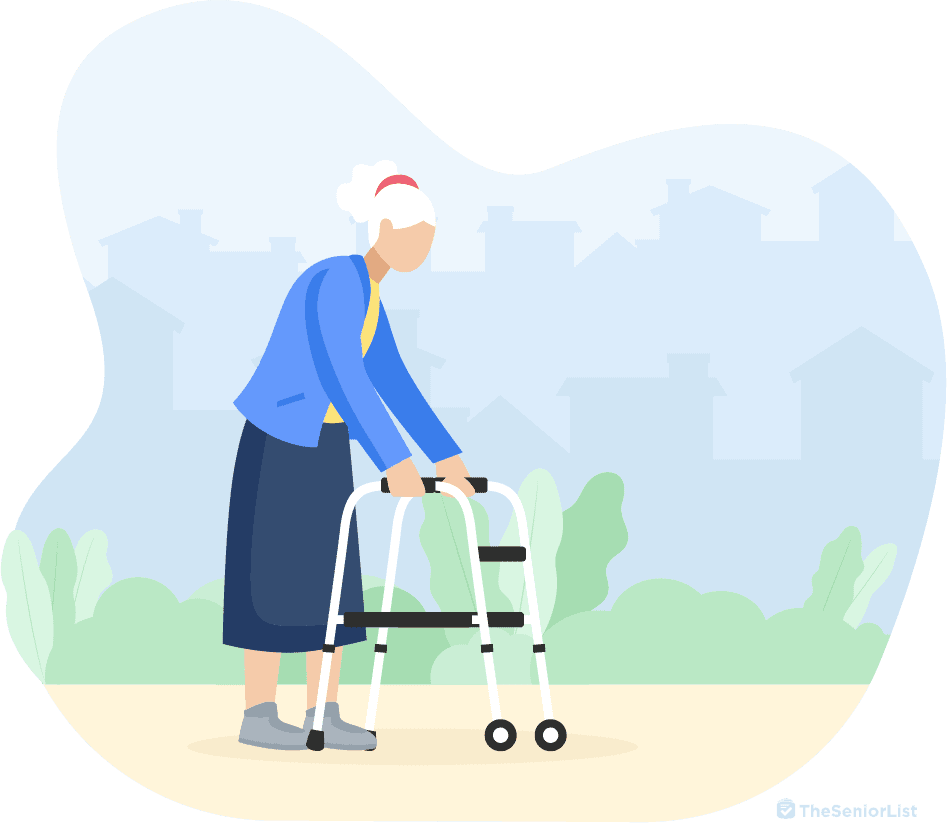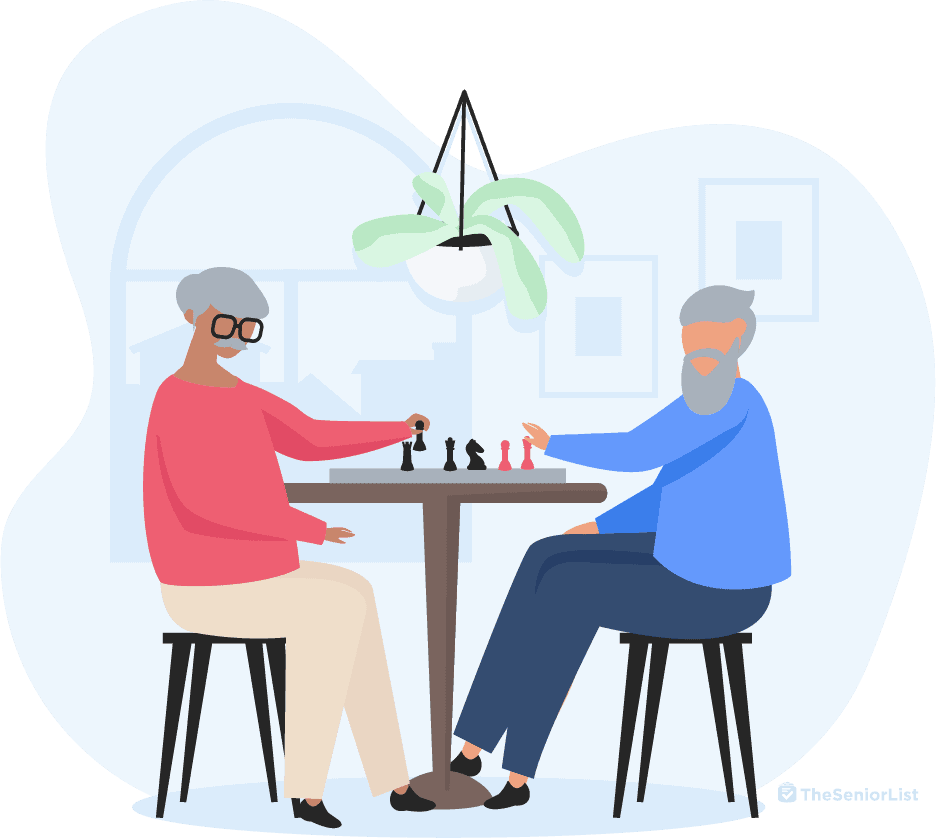Caring for a Parent With Dementia at Home
Each year, there are nearly 10 million new cases of dementia and related conditions. For many of us, a dementia diagnosis leaves us feeling helpless and scared; however, it’s essential to consider your loved one’s care plan.
You may be wondering if you would be able to care for someone with dementia safely. Luckily, with some education and planning, caring for your loved one in the home is possible! Using elderly home modifications, safety technology, communication practices, and routine adaptations, you can establish a safe and enriching environment that enables you to provide manageable at-home care for your loved one.
Pro Tip: Upon receiving a dementia diagnosis, it’s important to plan. To help you do so, I’d recommend checking out my dementia life expectancy calculator.
Early Signs of Dementia
The onset of dementia is usually gradual, and the course of the condition can span several years. It is important to be able to recognize the early signs so you can begin to establish your specific plan of care.
As an occupational therapy assistant, I have spent years working with people diagnosed with dementia, as well as their families, to address the functional implications of the diagnosis and help with the transition.

Generally, the signs of dementia include:
- Decreased short-term memory
- Forgetting recent conversations or events; forgetting the names of family and friends; forgetting where things are inside the home.
- Decreased or distorted perceptual skills
- Hallucinations, delusions, and time-shifting; misidentifying a family member (ex: believing their son to be their husband); confusing a TV remote with a phone; confusing present time with the past; getting lost in familiar places.
- Difficulty performing familiar tasks
- Difficulty preparing a well-known recipe; tying shoes; difficulty performing self-care activities.
- Problems with communication and language
- Trouble finding words; substituting words (ex: saying the thing you wear on your foot versus shoe); repetitive language; inappropriate comments; inability to comprehend common speech.
- Personality changes
- Becoming suspicious and withdrawn; losing interest in activities previously enjoyed; increased agitation or aggression; mood swings with no obvious cause.
Although dealing with some of these changes may seem daunting, there are ways to adapt your response to assist your loved one in remaining calm, feeling safe and loved, and finding joy in their lives as they progress.
The most important thing to remember is to avoid adding to a person’s frustration. While it’s important to allow yourself to feel frustrated, or upset in response to certain interactions, it’s still crucial to understand how confusing, polarizing, and emotional this is for them and to not react negatively.
How to Care for Someone With Dementia
Effective Communication Strategies
Make sure that your immediate environment is set up for success. Ensure there are no distractions (TV, radio, other conversations nearby) if possible. Try to set aside a proper block of time if you’re planning to have a longer conversation so you can allow for processing, redirecting time, and longer pauses.
Consider the time of day and the person’s ability to focus, and plan around it. For instance, many people living with dementia communicate more clearly in the mornings versus later in the day. Make sure before you begin your discussion that your loved one is not hungry, and has had a chance to use the bathroom to avoid internal distractions.
Active Listening
Sit down to get on the same level as the person you are communicating with. Make eye contact and nod in response; allow time for your loved one to finish a thought, and try not to interrupt.
If they are having a hard time finding a word, resist the urge to say the word for them, which can lead to an interruption in communication. Instead, ask them to describe what they are thinking about and assist that way.
Ask questions slowly and clearly — and only one at a time. At times, just showing that you care and are listening to their expressed needs and thoughts will be enough.
Active Speaking
Ask yes or no questions, or offer two choices. For example, “Would you like water or tea?” These sorts of questions give the person some control without overwhelming them.
Give visual cues or demonstrate, if appropriate. Always allow plenty of time for a response. Avoid correcting, and do not argue with incorrect or inaccurate statements, regardless of how strange it might seem to you, especially if the person is confusing time periods or having hallucinations.
When I was a new OT working in a skilled nursing home, I made this mistake with a patient who experienced frequent hallucinations with fear-based aggression behaviors. We were in his room and he began insisting there was a man in the corner, becoming more and more agitated. In my attempt to calm him, I continually invalidated his reality by insisting there was no other person in the room. Eventually, nursing staff were called in to assist. As my patient became more agitated, he eventually turned aggressive.
My mistake was contradicting his perception of what was real. Instead, I should have reassured him by listening to his concern, accepting it, reassuring him that I was there to help and trying to redirect his attention.
Reducing Frustrations
It can be extremely frustrating to a person living with dementia to no longer be able to complete formerly simple tasks. It is our job to help reduce this frustration by setting them up for success. By establishing a daily routine, your loved one will know what to expect and what is expected of them. Completing the same tasks in the same order each day will help, as in first using the bathroom, then brushing teeth, washing face, then getting dressed each morning.

Understand some days will be better than others, and always remain as flexible as you can. Keep the person involved in their life decisions as much as possible, within reason, to avoid feelings of helplessness. Offer two choices for meals, what to watch on tv, or what leisure activity they would like to participate in that day. Always remember to reduce distractions when setting up an activity such as a puzzle or home task.
Providing Distractions
Sometimes, it is helpful to actually provide distractions. Repetitive tasks with purpose, like folding laundry, sorting objects by group (“Mom, could you help me sort out these writing utensils? Pencils in one pile and markers in another pile? Thanks!”), or removing groceries from bags and staging on the counter to be put away.
These tactics can be used to redirect behavior, interrupt moments of emotional distress, or combat nonproductive rummaging or destructive behavior, to name a few. It will also give your loved one a feeling of control and accomplishment, which is paramount to their overall quality of life.
Offering Support
In almost all cases, offering quiet, empathetic support and simply listening, will be enough to calm a situation. Whether it’s forgetfulness, inability to problem-solve, disruptions in reality, faulty time perception, behavioral changes, or communication barriers, you’ll be surprised at how far this skill will go in soothing a loved one.
Redirection to an enjoyable task is one way to support your loved one in times of stress or sadness. Allow them to speak and share their feelings completely until there is a pause in the conversation or an appropriate time to switch subjects. Often asking for assistance with a simple task, like folding laundry, will be the best way to move away from a distressing situation. If not a task, suggest taking a walk, completing a puzzle or crossword together, or listening to music in another room. Remember that physical touch also goes a long way in making a person feel loved and supported. Gentle back rubs, hugs, and hand-holding, can be soothing.
Challenges of Caring for Someone With Dementia
As you can see, caring for a loved one living with dementia can definitely have its challenges. With a loss of communication and ability to complete simple tasks, more hands-on assistance is needed. As the condition progresses, your loved one may refuse to eat, get dressed, wander throughout the home or even attempt to leave the residence and go out into the community.
They may suffer from behavioral and personality changes, hallucinations, or delusions. All this can pose danger to your loved one and be quite distressing to deal with. The good news is that we can offer some solutions to these problems so that you can feel confident in your ability to care for them in the home.
Wandering
Dementia can cause people to lose familiarity with their surroundings, which leads to wandering. This is usually a repeated behavior and can be very dangerous if not dealt with before it becomes a problem. In the home, your loved one could wander into the garage, where dangerous tools are stored, or where falling over clutter could result in injury. More seriously, if out in the community, a person may find themselves in an unsafe neighborhood, or wander into another person’s home thinking it is their own.

To combat wandering, you can set up their environment to enhance daily activity, including the ability to walk around within safe confines, by arranging furniture to promote certain pathways and keeping doors locked to areas you do not want them to go. Alarms can be installed to go off if an outside door or gate is breached, or even if a person stands from a chair, in later stages.
A fenced yard with a stop sign at the gate is sometimes all it takes to keep a person oriented to their own yard. If you are interested in assistive technology, a medical alert with GPS can be worn by your loved one, alerting you when they have left a certain area.
Agitation
A very common behavioral change can be frequent and increasing agitation. This normally arises from frustration resulting from a loss of communication skills, confusion, or inability to problem-solve. Agitation can lead to aggressive behavior, which can cause major mental, physical, and emotional distress for caregivers.
While there are medications that can lessen agitation response, the side effects of these can be serious, including increased risk of heart attack, stroke, and falls. Harvard Medical School reports that new studies have found non-drug interventions are more effective over time in dealing with agitation than medical solutions.
To reduce agitation, it’s important to follow a daily routine as much as possible, be flexible, and offer quiet support. Physical touch, such as hand-holding and gentle massages, as well as pleasurable music can assist here, too. Physical activity such as a light, seated workout routine and going for walks or other outings for a change of scenery can do the trick, especially for those prone to aggression-based agitation.
Delusions or Hallucinations
When the person you’re caring for suffers from delusions (firmly held beliefs in things that are not real) or hallucinations (false perceptions of objects or events), it is vital that you respond appropriately to avoid further agitation. The most common delusions in people with dementia are beliefs that people are stealing from them, trying to harm them (commonly by poisoning their food), or that they are being followed or tracked by an entity. Hallucinations can cause an individual to see, smell, feel, hear, or taste something that isn’t there.
When addressing delusions, your response should always be to listen and acknowledge but do not play into the delusion or hallucination. Try to understand their feelings, and reassure them that they are not alone by using statements such as, “I know that this is frightening for you.”
Do not argue or dismiss, and try to gently redirect to another room or activity. Don’t take offense if the delusion involves you. Remember, no matter how silly it may seem to you, it is VERY real to them. A helpful tip when folks believe their items are being stolen (most often they are items like glasses or a wallet misplaced by the person themselves) is to purchase duplicates to have on hand for an easy solution at the moment.
People living with dementia are at a higher risk of developing delirium — a worsening or change in a person’s mental state that happens suddenly, over one to two days. Delirium is a serious, but very common and treatable condition. If your loved one suffers from hallucinations or delusions, it is easy to overlook the onset of delirium because some of the symptoms can be the same, such as paranoid behavior or seeing and hearing things that are not there. However, if your loved one suddenly has a change in their level of function (ex: having trouble walking or acting more disoriented than usual) or you notice they are unusually drowsy or restless, it is best to contact their primary care physician.
Sleeplessness or Sundowning
Sundowning is a phenomenon associated with increased confusion or restlessness that generally begins in the late afternoon and into the night. It is very common in people with Alzheimer’s and dementia, and with it usually comes increased wandering and agitation. Unless you have overnight assistance, this can present some challenges at home.
To address sleeplessness, limit napping during the day to encourage a normal sleep/wake schedule, and make sure your loved one gets some physical activity each day. In the evening, dim the lights, draw the shades and reduce noise in the home to reinforce the idea of nighttime and sleep. Playing soothing music at this time can also help. Make sure your loved one isn’t hungry or too cold, and doesn’t need to use the bathroom before bedtime.
Additionally, try to avoid caffeinated beverages later in the day, and try to eliminate alcoholic drinks altogether if possible, as both of these negatively impact restful sleep. If sundowning behaviors become extreme or unmanageable, notify your loved one’s primary care physician.
Disruption of Activities of Daily Living
Assisting a person with dementia in their self-care tasks can become very challenging, especially in the later stages. Due to impairments in executive functioning, memory, judgment or disordered perception, many times loved ones will begin to refuse showers, become incontinent and stop allowing toileting assistance, or decline food at mealtimes.
This can not only be frustrating but can lead to larger health problems. The solution is to remain calm and move slowly. Trying to rush a person while getting dressed or brushing teeth can only lead to frustration and agitation. Here are some tips for self-care:
- Grooming/dressing
- Assist with this task as needed, demonstrating the use of unfamiliar objects, like a brush, washcloth, or toothbrush (for instance, regarding the latter: how to hold, apply toothpaste, etc.).
- Backwards chaining, or breaking down the task into small steps, can be helpful here. This technique can be used while dressing as needed, as well as handing clothing items to the person in the order they should don them.
- For folks who need less assistance, simply lay each outfit out in its entirety and allow them to dress independently. Because many people confuse seasons, it’s a good idea to remove any inappropriate clothing items from the closet to avoid this issue.
- Bathing
- Often, this can be more of a sensory challenge than anything else. To put it simply, they come to dislike the sensation of the water pounding their skin. In these cases, find ways to adapt the task to get the desired outcome. Sponge baths or bed baths can be a good compromise.
- If they are open to showering, stand by for safety, always using a shower chair or tub bench, and encourage them to do as much as possible before stepping in.
- Forward chaining is used often in showering in my profession, as many people are able to start washing, then need more assistance with distal regions.
- Toileting
- If your loved one is incontinent, using absorbent underwear, or “briefs” is recommended. Avoid using terms like “diapers” to keep from infantilizing and to respect your loved one’s dignity.
- A toileting schedule is very effective, with briefs used for accidents. It’s a good idea to take your loved one to the bathroom at regularly scheduled times of the day to get them into a routine and avoid accidents.
- Often, a person will be unaware of urine present and will not notify you. Sitting in a wet brief can lead to skin breakdown which then leads to open wounds. A good rule of thumb is to help them use the toilet immediately upon waking, after each meal, before you leave the house, and before nap or bedtimes.
- Never demean or become angry when an incident of incontinence is observed. This will only lead to further upset. Using large, absorbent sheets, or “chucks” on the bed at bedtime in tandem with briefs can be a lifesaver and save you from changing sheets on a daily basis.
- Nutrition
- Provide a well-balanced diet, avoiding high saturated fat, high sugar, and high sodium content in foods. Arrange the plate to showcase different foods of varying colors to a person who loses interest in eating, to encourage a more contrasting plate.
- Because dehydration is a common problem in people living with dementia, it’s a good idea to offer hydrating foods for seniors, such as soups, smoothies, and fruit. Make sure your loved one has a cup of water nearby at all times and remind them to take sips throughout the day.
- If your loved one is having trouble with gross/fine motor coordination while eating, using weighted utensils, bowls and plates with raised edges and suctioned bottoms can be helpful. If they are requiring assistance while feeding to them, use backwards chaining (scoop a bite then hand the utensil to your loved one) for as long as possible to keep them engaged and involved in their own nourishment.
Dementia Care Plan
A dementia care plan, or your guide to navigating the often-complicated world of caring for a loved one with dementia, should start with the following:
-
- Set up your home to promote safety and combat wandering. Lock doors and arrange furniture and outside spaces to facilitate a safe living area. Install alarms or obtain a tracking device as needed.
- Establish your daily routine. Complete self-care routines, toileting, mealtimes, and wake/sleep schedule in the same manner each day, as much as possible. Remember, though, that flexibility and adaptation are sometimes just as important.
- Provide safe physical and mental stimulation. Find out what their favorite leisure activities used to be and find ways to accommodate or adapt activities to be similar. Accompany them on walks, or make sure they get outside and move each day to reduce agitation and sundowning.
- Communicate effectively. Actively listen, watch for nonverbal cues to behavior, be empathetic and warm, speak slowly and use simple phrases, avoid correcting, and redirect in instances of emotional distress.
- Take breaks to avoid caregiver burnout. Utilize local resources, services, friends, and other family members to get needed respite and recharge your own battery.
FYI: A medical alert system can be an effective way to help care for your loved one. To learn more, read my guide on medical alert bracelets for dementia patients.
Dementia Day Care
As a caregiver, it’s important to avoid burnout and make sure you’re taking physical and mental breaks as needed. In many cities, adult day centers are available as a means to do just that. These centers provide social opportunities, as well as varied activities for your loved one, in a safe and stimulating environment, while you’re able to rest, go out with friends, or run errands. Most centers provide meals and can accommodate caregivers who work during the day and/or offer weekend and evening hours.

Some other benefits include counseling services for caregivers and their families, personal care services, such as haircuts or nail trims, and on-site physical or occupational therapists. It is, however, important to do your research. Some centers will not accept people who are unable to toilet independently, have behavioral concerns such as wandering, inappropriate sexual behavior, or speech barriers. They can also be costly, as insurance typically does not cover day care services. Reach out to your local Alzheimer’s Association Chapter to find out what resources are in your area.
Pro Tip: If in-home care is not a viable option for you, then you might want to consider memory care. Read our guide to learn more about the average costs of memory care in 2025.
Rewards of Caring for a Parent With Dementia
While caring for a person with dementia has its challenges, it can also be a very rewarding experience. Speaking from experience, I can say some of my favorite patient interactions were with people in this category. I’ve heard some of the most vividly detailed stories — one recounted a visit to the Great Pyramids in the 1930s, while others offered some personal (and sometimes scandalous!) interactions with famous movie stars of the Golden Age. Still another recounted the exact moment a person fell in love with their betrothed.
You’d be surprised at how much you can learn about your loved one, while also providing a chance for them to share and be seen. You will laugh with each other in silly moments, and be the thread that holds this person to their old selves. The ability to connect and give of yourself so that your loved one is able to age and transition gracefully in their own homes, with feelings of security and love, is one of a kind. With the modifications and tips and tools we’ve discussed so far, It is very possible to care for a person living with dementia at home.
Learn More: For more caregiving resources, take a look at my guide: What Is a Caregiver?
Caregiving and Dementia Frequently Asked Questions
-
How do you care for a parent with dementia at home?
Ensure the environment is safe by arranging furniture, securing unsafe areas, and installing alarms to prevent wandering. Establish a daily routine, listen, and speak slowly, calmly, and simply for improved communication. Always reassure them often that you are there to help.
-
Is it possible to care for someone with dementia at home?
With some planning and education, it is very possible to safely and effectively care for someone with dementia at home.
-
How do you care for an elderly person with dementia?
You should understand the challenges related to this diagnosis — confusion, agitation, wandering, memory loss, etc. — and have a plan in place. Always take a soft approach and remember that physical touch and reminiscing are good ways to calm and redirect. Additionally, safeguard the home to prevent falls and other injuries.
-
How do you help a parent with dementia?
Use the knowledge you already have about your parent to best communicate with them in the style that they are used to. Use or modify their favorite leisure activities to engage their mind and body for addressing boredom and promoting good sleep patterns. Involve them by offering 2-3 choices during their daily routine and allow them to assist in all self-care tasks to maintain their independence for as long as possible.
